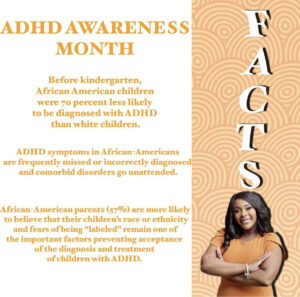
October is ADHD Awareness Month, and Florida A&M University student Skylar Boone plans to promote the truth about ADHD in every way.
“I was diagnosed with ADHD between the ages of 5-7,” Boone said. “My mom and I did not feed into the labels that the doctor tried to place on me, but rather found a way for me to flourish through the diagnosis.”
According to the Mayo Clinic, attention deficit hyperactivity disorder, or ADHD, is a chronic condition that affects millions of children and often continues into adulthood. ADHD is characterized by a number of chronic issues, including the inability to maintain focus, hyperactivity and impulsive behavior. Children with ADHD may also experience low self-esteem, strained relationships, and poor academic achievement.
Jessica Myers, also a student at FAMU, was unaware that October is ADHD Awareness Month. She said she’s thankful for Boone’s Instagram post.
“I never knew October was ADHD Awareness Month,” Myers said. “People only mention that October is breast cancer month.”
ADHD is one of the most common pediatric neurodevelopment conditions. It is most commonly diagnosed in childhood and lasts far into adulthood. Children with ADHD may struggle to pay attention, manage impulsive behaviors (doing without considering the consequences), or be extremely active, according to the Mayo Clinic.
“A common myth of people with ADHD is that we are dumb or we just lack self-control, but that is not the case,” Boone said.
ADHD is divided into three sub-types: predominantly inattentive, predominantly hyperactive/impulsive, and combined.
Predominantly inattentive is when the individual has difficulty organizing or completing a task, paying attention to details, or following instructions or conversations. The person is easily sidetracked and forgets regular details.
Predominantly hyperactive-Impulsive is when the person fidgets and talks a lot. It’s difficult for them to sit still for an extended period of time (e.g., for a meal or while doing homework). Smaller children may continually run, jump or climb. The person is restless and has a hard time controlling his or her impulsivity. Someone who is impulsive may frequently interrupt others, seize items from others, or talk at inappropriate moments.
It is difficult for the individual to wait their turn or follow directions. Impulsive people are more likely to be involved in accidents and injuries than others.
Combined is when the symptoms of the above two types are equally present in the person. Symptoms can change over time, so can the way they are presented.
After being diagnosed at an early age, Boone believes it’s OK to struggle with ADHD, but not to let it consume you.
“It can be very hard, but ADHD is real regardless of what people tell you,” she said. “It is a real struggle that is something you have to work on every single day.”